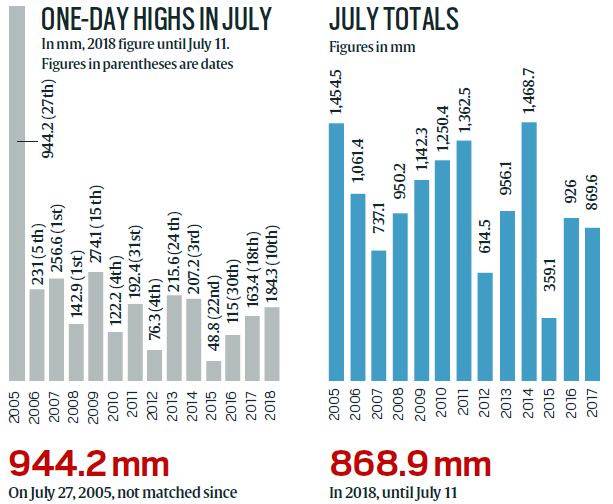Explained Snippets: Heaviest single-day rain in 4 years, Mumbai already past July average
By Wednesday, the IMD centre at Santacruz had recorded 868.9 mm over the first 11 days of July, already higher than the 840.7 mm average for the entire month over the last 30 years.
 Traffic at Mumbai-Pune Highway near Kharghar in Navi Mumbai following heavy rains and waterlogging. (Express photo by Narendra Vaskar/File).
Traffic at Mumbai-Pune Highway near Kharghar in Navi Mumbai following heavy rains and waterlogging. (Express photo by Narendra Vaskar/File).
Mumbai, pounded by rain over a number of days, received 184.3 mm on Tuesday, the highest amount of rainfall recorded in a single day in the last four years.
By Wednesday, the IMD centre at Santacruz had recorded 868.9 mm over the first 11 days of July, already higher than the 840.7 mm average for the entire month over the last 30 years.
 Source: India Meteorological Department, figures as recorded in Santacruz
Source: India Meteorological Department, figures as recorded in Santacruz
July in 2005, when Mumbai witnessed what is described as the “deluge”, had recorded 1,454.5 mm, which was exceeded in July 2014.
***
Tip for Reading List: How Data Answer Soccer questions
In 2009, economist Stefan Szymanski and sports journalist Simon Kuper came out with a book that looked at various aspects of football from an entirely statistical angle, using data to answer questions ranging from “Why do England lose?” and “Penalties — what are they good for?” to “Why do the Germans play with such an efficient but robotic style?” Soccernomics — alternatively titled Why England Lose — is out in an updated edition in a World Cup year, with an updated title: Soccernomics: Why England Loses; Why Germany, Spain, and France Win; and Why One Day Japan, Iraq, and the United States Will Become Kings of the World’s Most Popular Sport.
The 2018 edition covers issues ranging from TV rights to corruption, transfers and World Cup bids, with new material including analyses of the FIFA scandal, why Iceland win, and women’s football. A review by Forbes describes a new chapter, “Do Coaches Matter?”, which analyses manager performance versus wages. Using a sophisticated model based on financial statements filed by English clubs and other factors, the authors found that in the vast majority of cases, the manager doesn’t really matter — and in fact, can greatly hurt a club’s performance.
For those who read the first edition, the question is whether the new edition is worth buying. Writing for World Soccer Talk, reviewer Robert Hay says: “My answer is yes, as both authors clearly spent energy and time digging into the data to see if their original assertions hold up.” For example, after the first edition claimed that the US, Japan, and Australia would become kings of the sport, the authors now admit that “they underestimated the timeline for demographics to push these countries into the elite”, and explore why their predictions were wrong.
Photos



- 01
- 02
- 03
- 04
- 05



































